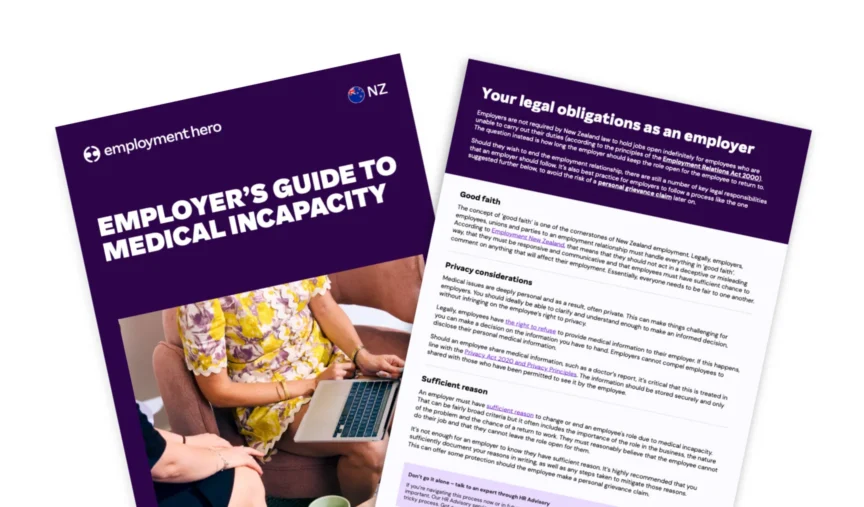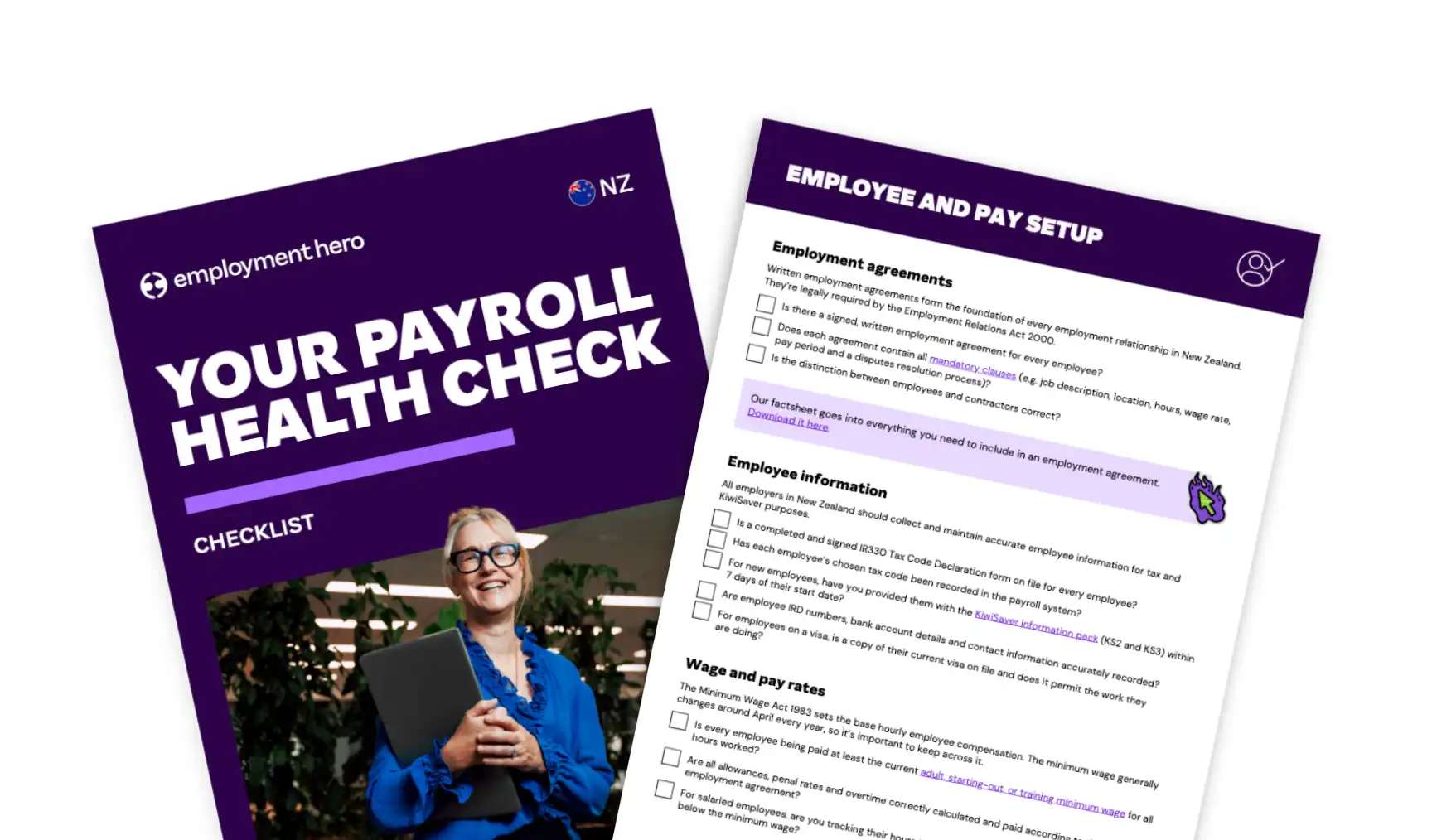Termination of employment due to medical incapacity factsheet
Published
Termination of employment due to medical incapacity factsheet
Published
2 min read
Sadly, life doesn’t always go to plan. Managing an employee who is unable to work due to a long-term illness or injury can be a challenging situation for any employer. You’re stuck between supporting your affected employee and ensuring that your business can function as normal.
Our factsheet is designed to provide you with some guidance on how to handle medical incapacity in a way that is both compassionate and in line with New Zealand employment law. The factsheet includes:
- Your legal obligations as an employer
- The requirements of a fair process
- Alternatives to termination
- The specifics of medical retirement
To download the factsheet, fill out the form on the right.
What is medical incapacity?
Medical incapacity is when an employee is unable to do their job as a result of illness or injury. It’s a challenging situation for all involved and as it includes a sensitive matter like health, needs to be handled with care by employers.
Common causes of medical incapacity
There are many different causes of medical incapacity. It may be some kind of physical hardship, such as a severe injury. There can also be mental health challenges or a chronic illness. Ultimately, medical incapacity is when whatever health issue the employee is experiencing is severe enough to stop them from performing the essential functions of their role.
Impact on employees and employers
When a team member can no longer perform their job due to illness or injury, it creates a difficult situation for everyone involved. Addressing medical incapacity requires a careful balance of empathy, legal compliance and business continuity.
Impact on the employee
For an employee, medical incapacity can be a stressful and life-altering event. The primary concern is often the loss of income. Long-term absence may exhaust sick leave, leading to a period without regular pay. This financial strain is compounded by the emotional and physical toll of dealing with a serious health condition.
If their illness or injury is covered by ACC, they may have additional financial support. However, navigating the complex systems of ACC can also be a challenge that requires significant time and effort.
Impact on the employer
For you, as the employer, the most immediate impact is on workforce planning. A key team member’s extended absence can disrupt projects, increase the workload on other staff and create a skills gap.
There are also significant potential legal risks. You have a duty of care and must act fairly and in good faith. Failure to follow proper procedures for managing medical incapacity can lead to claims of unfair dismissal.
Finally, a company’s approach to these situations has reputational considerations. A compassionate and supportive process reinforces a positive company culture and can improve morale and loyalty among the remaining staff. In contrast, an insensitive approach can damage the company’s reputation as a good employer, making it harder to attract talent in the future.
How an employer may respond to medical incapacity
There are a number of steps you can take if it appears that the employee will be unable to perform their role as they previously did. You should consider whether the employee could have their role adapted for the new situation or if an alternative role in the business would be better suited. You could also consider allowing extended leave for the employee to fully recover, if that’s feasible.
If it appears that the employee will no longer be able to work in the business due to medical incapacity, you have two options. You can either mutually agree with the employee that they take medical retirement or you can take steps to terminate their employment on the basis of medical incapacity. That last option should be the absolute last resort and you need to have explored all alternative options first.
Employer’s legal responsibilities around medical incapacity
It’s critical that you are aware of your legal obligations when your employee is dealing with medical incapacity. Here are a few important points worth noting.
Acting fairly and in good faith
One of the key principles underpinning New Zealand’s employment law is good faith. It’s more than just a nice idea—it’s a legal requirement that shapes every interaction in an employment relationship. This means employers, employees, and unions must act with honesty and transparency in every interaction.
When it comes to medical incapacity, you should follow that good faith principle, handle every process fairly and ensure that you’re allowing the employee opportunities to voice their opinions and concerns.
Avoiding discrimination
New Zealand’s Human Rights Act 1993 makes it illegal to discriminate against an employee based on a disability. Because of this, you should always consider making reasonable accommodations for disabilities and medical issues when a staff member requests them. If you decline the request, you should be able to prove that you had good reason to do so.
Following due process
In New Zealand, you can’t make hasty decisions when it comes to employment. This is because of the need for due process, ensuring that all steps are taken fairly and with a paper trail. In dealing with medical incapacity, you should always follow a recommended process and cover the key steps that will avoid the risk of a personal grievance claim later on.
What is the usual process for termination due to medical incapacity in NZ?
Employers should ensure they’ve covered all available avenues before termination due to medical incapacity and that there’s sufficient reason for the decision. This process can be broken down into a series of steps.
Obtaining medical assessments
To make a fair decision, you need to understand the employee’s condition and prognosis. You have the right to request medical information from your employee to understand:
- The nature of their illness or injury.
- Whether they can perform the core duties of their job.
- The likely timeframe for their return to work.
However, employees are entitled to refuse the request. If that happens, you can proceed with the information you already have.
Exploring reasonable adjustments
Before even considering termination, you must genuinely explore all possible alternatives. This is a crucial step that demonstrates a commitment to a fair process. You should consult with the employee about potential reasonable adjustments, such as modified duties, reduced hours or flexible work options.
Consultation and procedural fairness
You must engage in a fair and open consultation with the employee. That includes clearly communicating concerns about the employee’s prolonged absence and the impact it’s having on the business.
You should also provide the employee with any medical evidence they’re relying on and should listen to the employee’s perspective. A final decision shouldn’t be made until employee feedback has been considered.
At this stage, it may be worth considering offering medical retirement, which can only be mutually agreed to by both parties. This allows the employee to leave the role on their own terms and is often seen as the more positive option to termination. Some businesses may also offer some financial payment, although this is entirely optional.
Making a final decision
Only after you have completed all the previous steps and determined that the employee is unable to return to a role in their business within a reasonable timeframe, can you make a decision to terminate employment.
This is a significant legal step and we’d highly recommend that you seek legal advice before taking it. Our HR Advisory service can help with this – call or email them today.
It’s also really important that everything is documented, including conversation notes and written notice. This can help you in staying compliant and support you in the case of a personal grievance claim.
Key takeaways for employers
Successfully navigating a medical incapacity situation is a test of good faith and legal compliance. For employers, the key is to approach the process with a documented strategy that prioritises fairness and transparency.
Always begin with a genuine exploration of alternatives before jumping to termination. This includes a thorough consultation process and exploring all reasonable adjustments..
Finally, while the process is a business and legal one, it is also deeply personal for your employee. Handle every conversation with care and empathy. A fair and compassionate process protects not only your business but also your reputation as a responsible employer.
For more information on handling medical incapacity, download the factsheet.
The information in this article is current as at 11 September 2025, and has been prepared by Employment Hero Pty Ltd (ABN 11 160 047 709) and its related bodies corporate (Employment Hero). The views expressed in this article are general information only, are provided in good faith to assist employers and their employees, and should not be relied on as professional advice. Some information is based on data supplied by third parties. While such data is believed to be accurate, it has not been independently verified and no warranties are given that it is complete, accurate, up to date or fit for the purpose for which it is required. Employment Hero does not accept responsibility for any inaccuracy in such data and is not liable for any loss or damages arising directly or indirectly as a result of reliance on, use of or inability to use any information provided in this article. You should undertake your own research and seek professional advice before making any decisions or relying on the information in this article.
To download the factsheet, we just need a few quick details.
Related Resources
-
 Read more: Termination of employment due to medical incapacity factsheet
Read more: Termination of employment due to medical incapacity factsheetTermination of employment due to medical incapacity factsheet
Learn how to manage medical incapacity termination fairly and lawfully. Understand legal obligations, the termination process and best practice for…
-
 Read more: Payroll audit checklist for New Zealand businesses
Read more: Payroll audit checklist for New Zealand businessesPayroll audit checklist for New Zealand businesses
Published Published There are so many different elements that go into payroll, whether it’s deductions, payday filing or leave calculations.…
-
 Read more: Employment Hero Surpasses A$300M ARR
Read more: Employment Hero Surpasses A$300M ARREmployment Hero Surpasses A$300M ARR
Employment Hero surpasses $300M in annual recurring revenue (ARR), a major milestone in our mission to make employment easier worldwide.




















